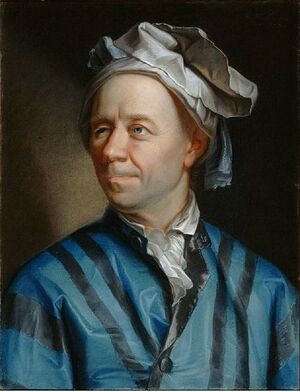Leonhard Euler (nonfiction): Difference between revisions
No edit summary |
No edit summary |
||
| Line 15: | Line 15: | ||
== Fiction cross-reference == | == Fiction cross-reference == | ||
* [[Crimes against mathematical constants]] | |||
== Nonfiction cross-reference == | == Nonfiction cross-reference == | ||
* [[Johann Bernoulli (nonfiction)]] - Doctoral advisor | |||
* [[Peter Gustav Lejeune Dirichlet (nonfiction)]] | |||
* [[e (nonfiction)]] | |||
* [[Nicolas Fuss (nonfiction)]] - Student | |||
* [[Christian Goldbach (nonfiction)]] | * [[Christian Goldbach (nonfiction)]] | ||
* [[ | * [[Johann Hennert (nonfiction)]] - Doctoral student | ||
* [[Joseph-Louis Lagrange (nonfiction)]] - Epistolary correspondent | |||
* [[Pierre-Simon Laplace (nonfiction)]] | |||
* [[Mathematics (nonfiction)]] | * [[Mathematics (nonfiction)]] | ||
* [[Physicist (nonfiction)]] | * [[Physicist (nonfiction)]] | ||
* [[ | * [[Stepan Rumovsky (nonfiction)]] - Student | ||
External links: | External links: | ||
Revision as of 17:21, 21 November 2017
Leonhard Euler (15 April 1707 – 18 September 1783) was a Swiss mathematician, physicist, astronomer, logician and engineer who made important and influential discoveries in many branches of mathematics like infinitesimal calculus and graph theory while also making pioneering contributions to several branches such as topology and analytic number theory. He is also known for his work in mechanics, fluid dynamics, optics, astronomy, and music theory.
He introduced much of the modern mathematical terminology and notation, particularly for mathematical analysis, such as the notion of a mathematical function.
Euler was one of the most eminent mathematicians of the 18th century, and is held to be one of the greatest in history. He is also widely considered to be the most prolific mathematician of all time. His collected works fill 60 to 80 quarto volumes, more than anybody in the field.
He spent most of his adult life in Saint Petersburg, Russia, and in Berlin, then the capital of Prussia.
A statement attributed to Pierre-Simon Laplace expresses Euler's influence on mathematics: "Read Euler, read Euler, he is the master of us all."
In the News
Fiction cross-reference
Nonfiction cross-reference
- Johann Bernoulli (nonfiction) - Doctoral advisor
- Peter Gustav Lejeune Dirichlet (nonfiction)
- e (nonfiction)
- Nicolas Fuss (nonfiction) - Student
- Christian Goldbach (nonfiction)
- Johann Hennert (nonfiction) - Doctoral student
- Joseph-Louis Lagrange (nonfiction) - Epistolary correspondent
- Pierre-Simon Laplace (nonfiction)
- Mathematics (nonfiction)
- Physicist (nonfiction)
- Stepan Rumovsky (nonfiction) - Student
External links:
- Leonhard Euler @ Wikipedia
